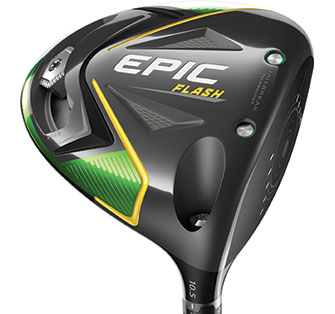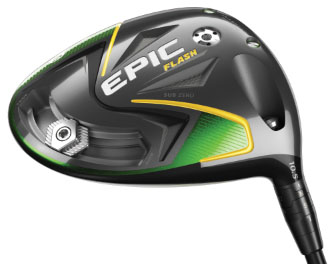I have to admit that when I first heard Callaway bought a $5 Million supercomputer to help
design golf clubs I was skeptical.
Then I hit the Epic Flash drivers. And spoke one-on-one with Callaway SVP of Research and
Development Alan “Doc Hock” Hocknell about the use of machine learning to do things
humans, or most computers, couldn’t.
I was hooked.
Related: Callaway Epic Flash and Epic Sub Zero Fairway Wood Review
Related: Callaway Apex 19 and Apex Pro 19 Irons Review
Related: Callaway PM Grind 2019 Wedge Review
Related: Odyssey Stroke Lab, EXO with Stroke Lab & Toulon Putter Review
Related: Callaway ERC Soft, Supersoft and Supersoft Magma Golf Balls
Machine Learning – an application of Artificial Intelligence – is the process where computers
“learn” to design a better product by going through thousands of design iterations virtually, as
opposed to the typical feedback loop of design-prototype-test. What used to be done only five
or six times could be virtually done 15,000 times.
 |
The Epic Flash (Callaway photo) |
For the Epic Flash drivers, Callaway decided to turn all that computational power loose on the
face of the club, where we make that all important impact with the ball. It is the first time AI
and Machine Learning have been used to design a consumer product.
“When I looked at it, [the new face] it scared me to death,” said Hocknell, who added “I don’t
know how that works.”
Since there are USGA limits on the so-called “trampoline effect” of a golf club face, the
supercomputer (we forgot to ask if she’s called “Big Bertha” – darn!) needed to work within
those constraints while still focusing on increasing ball speed across the face. No easy task!
The supercomputer came up with a variable face thickness and layout that was almost the polar
opposite of the traditional concept of having the thickest part in the middle, becoming thinner
towards the outer border.
 |
The Sub Zero (Callaway photo) |
There are waves, bumps, and rolls that would make Alister Mackenzie proud. But they aren’t on
the surface like a putting green, they are found on the reverse, smoothed out before
installation. As a matter of fact, each forged titanium face needs to be individually machined for
5-7 minutes on one of just two machines in the world capable of doing such sophisticated
production. And Callaway isn’t planning on selling just one or two of these!
“Human beliefs about what works would have constrained us from coming up with this design,”
said Hocknell.
The proof is on the range and course, and most players are seeing immediate ball speed gains
with Epic Flash. Ollie Schneiderjans picked up 10 mph of ball speed, going from 180 (that’s
already huge) to 190. And Maverick McNealy got 11 mph, taking his ball speed up to 181 from
170.
Those numbers are significant. And I can assure you, the drivers and fairways are USGA-
conforming.
So what did our testers think? Well, for starters, none of us gets 180mph ball speed. But most of us are scratch or single digit golfers, and we have experience with Callaway's Epic product line. (One of us even brought his gamer to the demo day, and went from 150 mph ball speed to 159 after just a few strikes.)
None of this is any good if you don't enjoy the feel (check this box off) and if the sound doesn't mesh with what you're expecting (check that one off too, Epic Flash is loud but not obnoxious -- you've got to intimidate your playing partners after all). The third criteria we have is shot dispersion and ease of launch. We checked this off the list by verifying that Epic Flash Sub Zero isn't just for the high swing speed folks, with the higher lofted version it can be a perfect fit for someone who wants high launch but without so much spin. It all depends on your swing.
Both models setup nice and square and, well, did we say they used a Supercomputer? Check out our interview with Callaway VP of R&D Dr. Alan Hocknell below, and read on for all the key features and benefits of the first consumer product designed with the assistance of machine learning.
Here is a look at what you can expect from Epic Flash. (As always, getting custom fitted by one
of thousands of Callaway staff professionals is highly recommend.)
KEY FEATURES & BENEFITS
New Flash Face Technology for Faster Ball Speed
Callaway engineers used Machine Learning – an application of Artificial Intelligence – to create a unique and radically different face design to increase ball speed in the center region of the face.
Jailbreak Technology for Faster Ball Speed
Callaway continues to refine its Jailbreak Technology, which positions two ultra-light, strong titanium bars behind the face, parallel to each other and connected on either end to the crown and sole. These bars stiffen and stabilize the crown and sole, placing more impact load on the face to promote faster ball speed.
Adjustable Perimeter Weighting for Ball Flight Control
In the Epic Flash, a sliding 16-gram weight allows golfers to easily promote their desired ball fight, whether it's a draw, a fade or a straighter flight. And for the first time, the Sub Zero gives golfers the same power, with a 12-gram sliding weight.
High MOI Head Design and Materials
Moment of Inertia (MOI) is a measure of resistance to clubhead twisting, and the higher the MOI, the higher the forgiveness for off-center hits. The Epic Flash has a new lighter triaxial carbon fabric called T2C which has a tighter weave; since it is lighter, the weight it saves can be redistributed elsewhere within the head to raise MOI. The Sub Zero raises the MOI through the shape of the clubhead and the distribution of the internal weighting, and combines it with a low spin rate, which again is all about forgiveness and speed.
WHAT'S IN THE BOX
Shaft options
For the Sub Zero, golfers can choose from one of two stock shaft options: Project X HZRDUS Smoke and Mitsubishi Tensei AV. For the Epic Flash, there is a third option: Project X EvenFlow.
Grips
The Stock grip in both drivers is Golf Pride’s premium Tour Velvet ALIGN Grip with a special green "reminder" ridge underneath unique to the Epic Flash.
AVAILABILITY
The Epic Flash and Epic Flash Sub Zero drivers will be available to the public on February 1, 2019. Each will retail at a price of $529.99.